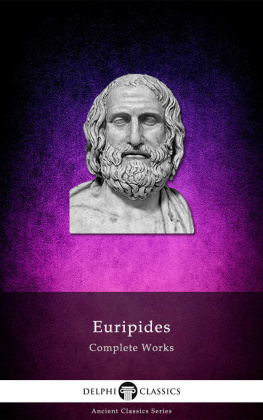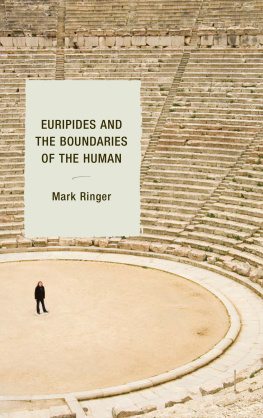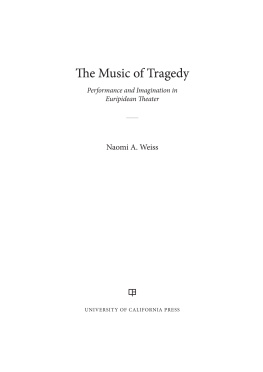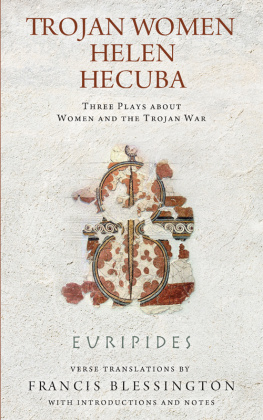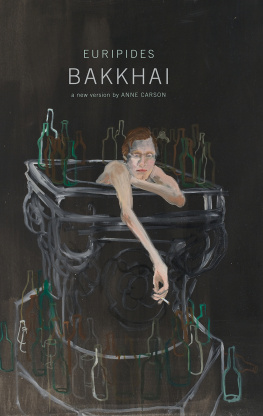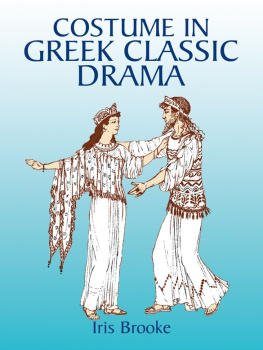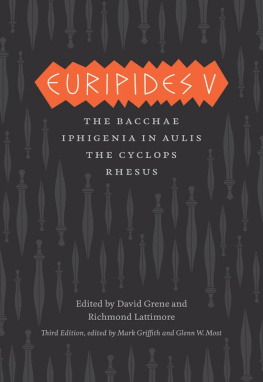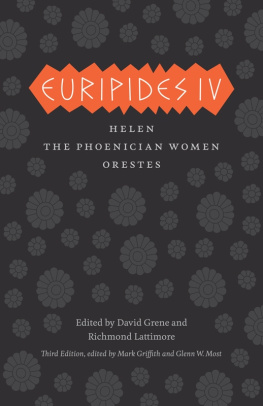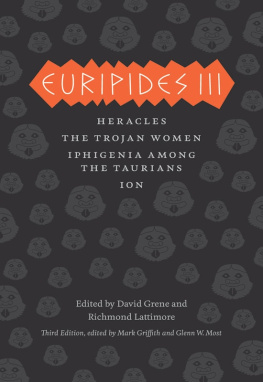Euripides - Classic Greek Drama: 10 Plays by Euripides in a Single File [NOOK Book]
Here you can read online Euripides - Classic Greek Drama: 10 Plays by Euripides in a Single File [NOOK Book] full text of the book (entire story) in english for free. Download pdf and epub, get meaning, cover and reviews about this ebook. publisher: B&R Samizdat Express, genre: Science. Description of the work, (preface) as well as reviews are available. Best literature library LitArk.com created for fans of good reading and offers a wide selection of genres:
Romance novel
Science fiction
Adventure
Detective
Science
History
Home and family
Prose
Art
Politics
Computer
Non-fiction
Religion
Business
Children
Humor
Choose a favorite category and find really read worthwhile books. Enjoy immersion in the world of imagination, feel the emotions of the characters or learn something new for yourself, make an fascinating discovery.
Classic Greek Drama: 10 Plays by Euripides in a Single File [NOOK Book]: summary, description and annotation
We offer to read an annotation, description, summary or preface (depends on what the author of the book "Classic Greek Drama: 10 Plays by Euripides in a Single File [NOOK Book]" wrote himself). If you haven't found the necessary information about the book — write in the comments, we will try to find it.
Classic Greek Drama: 10 Plays by Euripides in a Single File [NOOK Book] — read online for free the complete book (whole text) full work
Below is the text of the book, divided by pages. System saving the place of the last page read, allows you to conveniently read the book "Classic Greek Drama: 10 Plays by Euripides in a Single File [NOOK Book]" online for free, without having to search again every time where you left off. Put a bookmark, and you can go to the page where you finished reading at any time.
Font size:
Interval:
Bookmark:
THE TRAGEDIES OF EURIPIDES.
LITERALLY TRANSLATED OR REVISED,
WITH CRITICAL AND EXPLANATORY NOTES,
BY THEODORE ALOIS BUCKLEY, OF CHRIST CHURCH.
NEW YORK:
HARPER & BROTHERS, PUBLISHERS,
FRANKLIN SQUARE.
1892.
_____________
Published by B&R Samizdat Express. Feedback welcome seltzer@samizdat.com
________________
_____________________
The translations of the first six plays in the present volume were published at Oxford some years since, and have been frequently reprinted. They are now carefully revised according to Dindorf's text, and are accompanied by a few additional notes adapted to the requirements of the student.
The translations of the Bacchae, Heraclidae, and the two Iphigenias, are based upon the same text, with certain exceptions, which are pointed out at the foot of the page. The annotations on the Iphigenias are almost exclusively critical, as it is presumed that a student who proceeds to the reading of these somewhat difficult plays[1], will be sufficiently advanced in his acquaintance with the Greek drama to dispense with more elementary information.
T.A. BUCKLEY,
CHRIST CHURCH, OXFORD.
[1] The reader will obtain some notion of the difficulties alluded to, and the best mode of grappling with them, by consulting the recent Cambridge edition, published with English notes (Iph. in Aulide, 1840, in Tauris, 1846), performances of great critical acumen, attributed to the present Bishop of Gloucester.
___________
Euripides, son of Mnesarchus, was born in the island of Salamis, on the day of the celebrated victory (B.C. 480). His mother, Clito, had been sent thither in company with the other Athenian women, when Attica was given up, and the ships became at once the refuge of the male population, and the national defense. Mr. Donaldson[1] well remarks, that the patronymic form of his name, derived from the Euripus, which was the scene of the first successful resistance offered to the Persian navy, shows that the attention of his parents was fully excited by the stirring events of the time.
Notwithstanding the fact that his mother had been an herb-seller, it is probable that his father was a man of some family. That he was at least possessed of ample means, is evident from the care and expense bestowed upon our poet's education. Under the tutorship of Anaxagoras, Prodicus, and Protagoras, he had studied both natural philosophy and rhetoric in its sophistical form. In gymnastic exercises he exhibited a successful prowess, being twice victorious in the Eleusinian and Thesean games. Of his skill in painting, some specimens were preserved at Megara.
His appearance as a dramatist was at an earlier age than that of his predecessors, as he was only five and twenty years old when he produced the "Peliades," his first tragedy. On this occasion, he gained the third prize in the tragic contests, but the first, fourteen years after, and subsequently, with the "Hippolytus," in 428 B.C. The peculiar tendency of some of the ideas expressed in his plays, was the probable cause of the retirement of Euripides to Macedonia, where he obtained the friendship of King Archelaus. Perhaps, however, the unhappiness of his connubial state, arising from the infidelity of his two wives, might have rendered Athens a disagreeable place of abode for the woman-hating poet, especially when his "domestic bliss" was continually seasoned by the sarcastic jokes and allusions of his political enemy, Aristophanes. Moreover, his acquaintance with the talking philosopher, Socrates, must have been unfavorable to the continuance of his popularity.
The fate of Pentheus in our author's noble play, the "Bacchae," appears to have given origin to the tradition that he himself was torn to pieces by dogs. If we reflect that this play was probably the last of his works, the mistake seems a plausible one. The death of Euripides, which probably happened in the ordinary course of nature, has, like that of AEschylus, been associated with the marvelous.
The Athenians vainly craved the honor of giving a resting-place to the ashes of their philosopher-poet. He was buried at Pella, but a cenotaph at Athens showed that his countrymen had not forgotten Euripides. His death took place B.C. 406.
The inferiority of our author to the greater tragedians, prevents our feeling much desire to enter upon the respective merits and demerits of his several plays, especially as we are completely anticipated by Schlegel, with whose masterly analysis every reader ought to be acquainted. Nevertheless, a few general remarks may, perhaps, be not wholly unprofitable.
It has been truly remarked, that tragedy, in no small degree, owed its downfall to Euripides. Poetry was gradually superseded by rhetoric, sublimity by earnestness, pathos by reasoning. Thus, Iphigenia and Macaria give so many good reasons for dying, that the sacrifice appears very small, and a modern wag in the upper regions of the theatre would, at the end of the speech of the latter heroine, almost have exclaimed, "Then why don't you die?"
It has been said, that our poet drew the characters of life as he found them, but bad as his characters are, they exhibit only a vulgar wickedness. Unable to portray a Clytaemnestra, he revels in the continual paltriness of a Menelaus or Ulysses. As if he took a delight in the black side of humanity, he loves to show the strength of false reasoning, of sophistry antagonistic to truth, and of cold expediency in opposition to the natural feelings of humanity. From a similar reason, his occasional attempts at comedy degenerate into mere farce. We question whether the scene between Death and Apollo in the "Alcestis," could be surpassed in vulgarity, even by the modern school of English dramatists, while his exaggerations in the minor characters are scarcely to be surpassed by the lowest writer of any period.
Under Euripides, the stage began gradually to approximate more closely to the ordinary and, at that time, debased character of Athenian society. A contempt for the Lacedaemonians, a passionate taste for the babbling and trickery of the forum, and an attempt to depreciate the social position and influence of the weaker sex, form the most unamiable features of this change. Yet we must allow, that if Euripides has reveled in the amiabilities of a Melanippe or a Phaedra, in the gentle revenge of a Medea or Hecuba, he has at the same time given us an Alcestis, the only real example of genuine conjugal affection on the Greek stage.
Nor must we forget that Euripides is a greater admirer of nature, a more complete delineator of her workings, than the two greater tragedians. He has more of illustrative philosophy, more of regard to the objects of the animated creation, the system of the universe, than his greater rivals exhibit. He is, as Vitruvius has justly styled him, a "stage-philosopher." Did we possess a larger acquaintance with the works of Parmenides, Empedocles, and other early cosmogonists, we should perhaps think less of his merits on this head: as it is, the possession of some such fragments of our poet makes us deeply regret the loss of the plays themselves.
But his very love for the contemplation of nature has in no small degree contributed to the mischievous skepticism promulgated by our poet. In early times, when a rural theogony was the standard of belief, when each star had its deity, each deity its undisputed, unquestioned prerogative and worship, there was little inclination, less opportunity, for skepticism. Throughout the poetry of Hesiod, we find this feeling ever predominant, a feeling which Virgil and Tibullus well knew how to appreciate. Even Euripides himself, perhaps taught by some dangerous lessons at home, has expressed his belief that it is best "not to be too clever in matters regarding the Gods."[2] A calm retreat in the wild, picturesque tracts of Macedonia, might have had some share in reforming this spoiled pupil of the sophists. But as we find that the too careful contemplation of nature degenerates into superstition or rationalism in their various forms, so Euripides had imbibed the taste for saying startling things,[3] rather than wise; for reducing the principles of creation to materialism, the doctrines of right and wrong to expediency, and immutable truths to a popular system of question and answer. Like the generality of sophists, he took away a received truth, and left nothing to supply its place; he reasoned falsehood into probability, truth into nonentity.
Font size:
Interval:
Bookmark:
Similar books «Classic Greek Drama: 10 Plays by Euripides in a Single File [NOOK Book]»
Look at similar books to Classic Greek Drama: 10 Plays by Euripides in a Single File [NOOK Book]. We have selected literature similar in name and meaning in the hope of providing readers with more options to find new, interesting, not yet read works.
Discussion, reviews of the book Classic Greek Drama: 10 Plays by Euripides in a Single File [NOOK Book] and just readers' own opinions. Leave your comments, write what you think about the work, its meaning or the main characters. Specify what exactly you liked and what you didn't like, and why you think so.

![Euripides Classic Greek Drama: 10 Plays by Euripides in a Single File [NOOK Book]](/uploads/posts/book/43473/thumbs/euripides-classic-greek-drama-10-plays-by.jpg)
